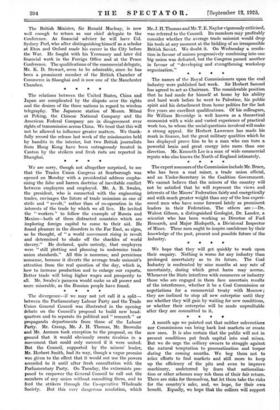The divergence—if we may not yet call it a split—
between the Parliamentary Labour Party and the Trade Union General Council was illustrated in the opening debate on the Council's proposal to build new head- quarters and to separate its political and " research " or propaganda departments from those of the Labour Party. Mr. Cramp, Mr. J. H. Thomas, Mr. Brownlie and Mr. Ammon took exception to the proposal, on the ground that it would obviously create rivalries in a movement that could only succeed if it were united. But the Council, supported by the miners' leader, Mr. Herbert Smith, had its way, though a vague promise was given to the effect that it would not use the powers accorded to it until after fresh consultation with the Parliamentary Party. On Tuesday, the extremists pro- posed to empower the General Council to call out the members of any union without consulting them, and to feed the strikers through the Co-operative Wholesale Society. But this very dangerous resolution, which Mr. J. H. Thomas and Mr. T. E. Naylor vigorously criticised, was referred to the Council. Its members may profitably consider whether the average trade unionist would drop his tools at any moment at the bidding of an irresponsible British Soviet. We doubt it. On Wednesday a resolu- tion in favour of unions progressively combining into one big union was defeated, but the Congress passed another in favour of " developing and strengthening workshop organization."










































 Previous page
Previous page